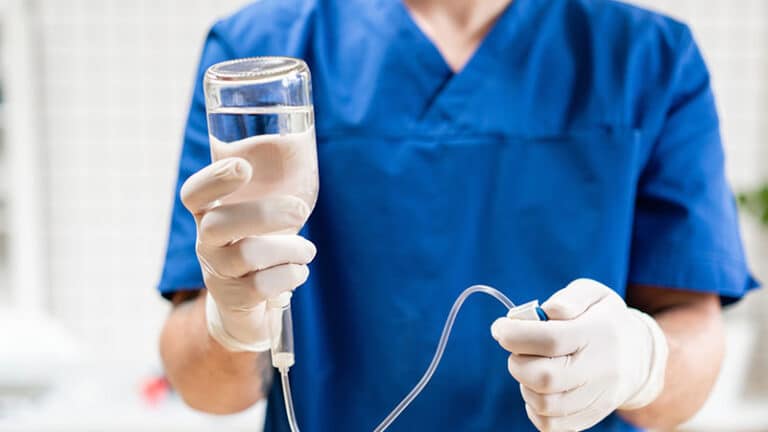Ketamine Infusion Therapy
Alcohol withdrawal can be a difficult and sometimes dangerous process, especially for individuals with long-term or heavy alcohol use. Traditional treatments may not work for everyone, leading many to explore innovative options like ketamine therapy.
Ketamine, originally used as an anesthetic, is now being studied for its ability to reduce withdrawal symptoms and support long-term recovery from alcohol dependence. Research shows that individuals receiving ketamine during alcohol detox were more than twice as likely to remain abstinent at six months compared to those who didn’t receive it.
Questions answered in this article:
Our Addiction Treatment Centers

Scottsdale Rehab
Luxury Personalized Rehab

HART Rehab
Holistic Luxury Personalized Rehab

Scottsdale Detox
Luxury Medical Detox
What is Alcohol Withdrawal?
Alcohol withdrawal is the body’s reaction when someone who has been drinking heavily for a long time suddenly stops or reduces their alcohol intake. It can cause symptoms like anxiety, sweating, shaking, nausea, and in severe cases, seizures or confusion.
Ketamine Therapy for Alcoholism
Ketamine therapy for alcoholism involves using small, controlled doses of ketamine to help people reduce cravings and change harmful drinking behaviors. It is usually combined with counseling or therapy to support long-term recovery.
Ketamine works by affecting certain brain pathways related to mood, memory, and addiction, which can help reset patterns linked to alcohol dependence. Some people find it helpful for breaking the cycle of addiction and gaining a fresh start in their recovery journey.
What Are the Benefits of Ketamine Treatment?
Ketamine treatment is gaining attention for its fast-acting and unique effects on the brain, especially in mental health and addiction recovery. Below are some of the key benefits people may experience:
1. Rapid Relief from Depression and Anxiety
Ketamine can reduce symptoms of depression and anxiety within hours, unlike traditional medications that take weeks. This fast response is especially helpful for those in crisis or who haven’t found relief with other treatments.
2. Reduced Cravings and Alcohol Use
In alcohol addiction, ketamine may lower cravings and help people feel less urge to drink. This can support long-term sobriety and make early recovery more manageable.
3. Improved Therapy Engagement
Ketamine can open the mind and make people more receptive during counseling sessions. This helps therapy become more effective by encouraging deeper emotional processing.
4. Neuroplasticity and Brain Healing
Ketamine promotes neuroplasticity, which means the brain can form new, healthier connections. This may help “reset” harmful patterns linked to addiction or trauma.
5. Low Risk of Daily Dependence
Unlike some medications, ketamine isn’t taken daily and is usually administered in controlled settings. This lowers the risk of developing a new dependency.
Side Effects of Ketamine Use
While ketamine treatment can offer important benefits, it also comes with potential side effects. These vary from person to person and are usually temporary, especially when ketamine is used in a clinical setting.
- Dissociation or “Out-of-Body” Feelings: Some people may feel disconnected from their body or surroundings during treatment. This sensation usually fades within an hour after the session ends.
- Nausea and Dizziness: Ketamine can cause nausea or a spinning feeling, especially right after it’s given. These side effects are typically short-lived and manageable.
- Elevated Blood Pressure or Heart Rate: The drug may temporarily raise blood pressure or heart rate during a session. Medical staff monitor these changes closely to ensure safety.
- Confusion or Disorientation: People sometimes feel confused or mentally foggy for a short time after treatment. This usually clears up within a few hours.
- Headache or Fatigue: Some users report headaches or tiredness after the effects wear off. These symptoms are generally mild and go away on their own.
- Risk of Misuse in Non-Clinical Settings: When used outside of medical care, ketamine has the potential for misuse or dependence. That’s why it’s important to receive it only under professional supervision.
Ketamine Treatment Process
Ketamine treatment is a structured, medically supervised process designed to support mental health and addiction recovery. Each step ensures safety, comfort, and effectiveness for the person receiving care.
- Initial Consultation: A medical provider reviews your health history and determines if ketamine is a safe and appropriate option.
- Customized Treatment Plan: A personalized plan is created based on your needs, goals, and the condition being treated.
- Pre-Treatment Preparation: You’ll receive instructions on how to prepare, which may include fasting or avoiding certain medications.
- Ketamine Administration: Ketamine is administered through an IV, injection, lozenge, or nasal spray under medical supervision.
- Observation and Monitoring: You are closely monitored during and after the session to ensure your safety and manage any side effects.
- Integration and Follow-Up: After treatment, you may meet with a therapist to process the experience and reinforce positive changes.


